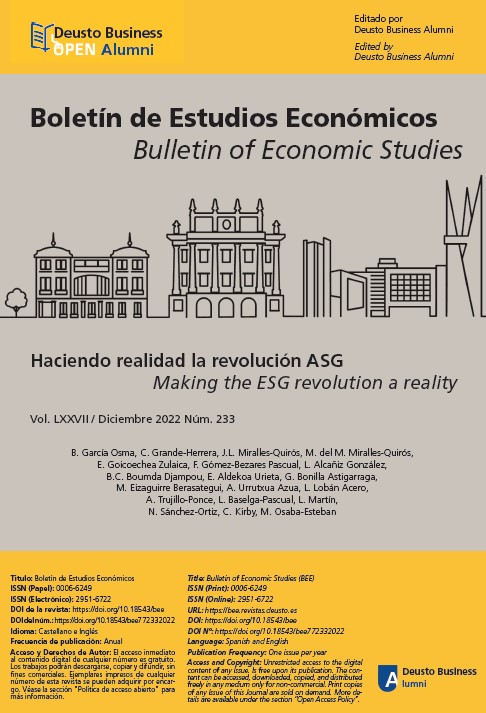¿Nuevas formas de gobierno empresarial? Activismo e influencia de terceras partes interesadas en la información económico-financiera
Resumen
El activismo emerge en fechas recientes como un nuevo potencial mecanismo de gobierno corporativo de las empresas. Si bien la influencia de terceras partes interesadas y fundamentalmente, de los inversores institucionales, es aún limitada en Europa, su creciente rol en otros países sugiere la posibilidad de una gran importancia futura. En este trabajo se ofrece una panorámica de la evidencia académica sobre este fenómeno reciente, centrándonos en cómo el activismo influye en la información económico-financiera preparada por las empresas. Concluimos el trabajo con algunas reflexiones sobre posibles implicaciones para profesionales y reguladores.
Recibido: 16 septiembre 2022
Aceptado: 26 septiembre 2022
Citas
Baloria, V. P., & Heese, J. (2018). The effects of media slant on firm behavior. Journal of Financial Economics, 129(1), 184-202.
Barua, A., Raghunandan, K., & Rama, D. V. (2017). Shareholder votes on auditor ratification and subsequent auditor dismissals. Accounting Horizons, 31(1), 129– 139.
Beaver, W. H., McNichols, M. F., & Wang, Z. Z. (2020). Increased market response to earnings announcements in the 21st century: An empirical investigation. Journal of Accounting and Economics, 69(1), 101-244.
Bischof, J., Daske, H., & Sextroh, C. J. (2020). Why do politicians intervene in accounting regulation? The role of ideology and special interests. Journal of Accounting Research, 58 (3), 589-642.
Black, B. S. (1990). Shareholder passivity reexamined. Michigan Law Review, 89,(3), 520-608.
Bozanic, Z., Hoopes, J. L., Thornock, J. R. & Williams, B. (2017). IRS attention. Journal of Accounting Research, 55(1), 79-114.
Bushee, B.J., & Miller, G.S. (2012). Investor relations, firm visibility, and investor following. The Accounting Review, 87(3), 867-897.
Cascino, S., Correia, M., & Tamayo, A. (2020). Does consumer protection enhance disclosure credibility in reward crowdfunding? Journal of Accounting Research, 57(5), 1247-1302.
Cohen, L., Malloy, C., & Nguyen, Q. (2020). Lazy prices. The Journal of Finance. 75(3), 1371-1415.
Dai, L., Parwada, J. T., & Zhang, B. (2015). The governance effect of the media’s role: Evidence from insider trading. Journal of Accounting Research, 53(2), 331-366.
Dimson, E., Karakas, O., & Li, X. (2015). Active ownership. The Review of Financial Studies, 28(12), 3325-3368.
Drake, M. S., Guest, N. M., & Twedt, B. J. (2014). The media and mispricing: The role of the business press in the pricing of accounting information. The Accounting Review, 89(5), 1673-1701.
Drake, M.S., Hales, J., & Rees, L. (2019). Disclosure overload? A professional user perspective on the usefulness of general-purpose financial statements. Contemporary Accounting Research, 36(4), 1935-1965.
Dyck, A., Volchkova, N., & Zingales, L. (2008). The corporate governance role of the media: Evidence from Russia. The Journal of Finance, 63(3), 1093-1135.
Dyreng, S. D., Hoopes, J. L., & Wilde, J. H. (2016). Public pressure and corporate tax behavior. Journal of Accounting Research, 54(1), 147-186.
Ferri, F. & Sandino, T. (2009). The impact of shareholder activism on financial reporting and compensation: The case of employee stock options expensing. The Accounting Review, 84, 433-466.
Financial Accounting Standards Board (FASB) (2018). Statement of Financial Accounting Concepts No. 8: Chapter 8, Notes to Financial Statements. Norwalk, CT: FASB Foundation.
García Osma, B., & Grande-Herrera, C. (2021). The role of users’ engagement in shaping financial reporting: should activists target accounting more? Accounting and Business Research, 51(5), 511-544.
Giner, B., & Mora, A. (2021). Political interference in private entities’ financial reporting and the public interest: Evidence from the Spanish financial crisis. Accounting, Auditing & Accountability Journal, 34(7), 1581-1607.
Grant, S. M. (2020). How does using a mobile device change investors’ reaction to firm disclosures? Journal of Accounting Research, 58(3), 741-775.
Green, T. C., Jame, R., Markov, S., & Subasi, M. (2014). Broker-hosted investor conferences. Journal of Accounting and Economics, 58(1), 142-166.
Grewal, J., Serafeim, G., & Yoon, A. (2016). Shareholder activism on sustainability issues. Harvard Business School Working Paper. Disponible online en: https://dash.harvard.edu/handle/1/27864360, (consultado Sep-2022).
Grossman, S., & Hart, O. (1980). Takeover bids, the free rider problem, and the theory of the corporation. Bell Journal of Economics, 11(1), 42-64.
Guo, F., Lin, C., Masli, A., & Wilkins, M. S. (2021). Auditor responses to shareholder activism. Contemporary Accounting Research, 38(1), 63-95.
Hirschman, A. O. (1970). Exit, Voice, and Loyalty: Responses to Decline in Firms, Organizations, and States. Cambridge: Harvard University Press.
Huang, K., Li, M., & Markov, S. (2020). What do employees know? Evidence from a social media platform. The Accounting Review, 95(2), 199-226.
International Accounting Standards Board (IASB). (2018). Conceptual Framework for Financial Reporting. London, U.K.: IFRS Foundation.
Klein, A., & Zur, E. (2009). Entrepreneurial shareholder activism: Hedge funds and other private investors. The Journal of Finance, 64(1), 187-229.
Krishnan, J., & Ye, Z. (2005). Why some companies seek shareholder ratification on auditor selection. Accounting Horizons, 19(4), 237-254.
Lev, B., & Rajgopal, S. (2016). Why FASB should hit pause. Accounting Today. Disponible en: https://www.accountingtoday.com/news/why-fasb-should-hit-pause, (consultado Sep-2022).
McCahery, J. A., Sautner, Z., & Starks, L. T. (2016). Behind the scenes: The corporate governance preferences of institutional investors. The Journal of Finance, 71(6), 2905-2932.
Pelger, C., & Spieβ, N. (2017). On the IASB’s construction of legitimacy – the case of the agenda consultation project. Accounting and Business Research, 47(1), 64-90.
Piotroski, J. D., & Roulstone, B. T. (2004). The influence of analysts, institutional investors, and insiders on the incorporation of market, industry and firm-specific information into stock prices. The Accounting Review, 79(4), 1119-1151.
Power, M. (2010). Fair value accounting, financial economics and the transformation of reliability. Accounting and Business Research, 40(3), 197-210.
Renneboog, L., & Szilagyi, P. G. (2011). The role of shareholder proposals in corporate governance. Journal of Corporate Finance, 17(1), 167-188.
Sainty, B. J., Taylor, G. K., & Williams, D. D. (2002). Investor dissatisfaction toward auditors. Journal of Accounting, Auditing & Finance, 17(2), 111–136.
Securities and Exchange Commission. (2020). General Electric agrees to pay $200 million penalty for disclosure violations. Press Release 2020-312. Washington D.C, Diciembre 9. Disponible online: https://www.sec.gov/news/press-release/2020-312 (consultado Sep-2022).
Shleifer, A., & Vishny, R. (1986). Large shareholders and corporate control. Journal of Political Economy, 94(3), 461-468.
Solomon, D., & Soltes, E. (2015). What are we meeting for? the consequences of private meetings with investors. Journal of Law and Economics, 58(2), 325-354.
Thomas, R. S., & Cotter, J. F. (2007). Shareholder proposals in the new millennium: Shareholder support, board response and market reaction. Journal of Corporate Finance, 13(2-3), 368-391.
Williams, P., & Ravenscroft, S. (2015). Rethinking decision usefulness. Contemporary Accounting Research, 32(2), 763-788.
Licencia:
Los trabajos publicados en esta revista desde 2021 se encuentran disponibles bajo la licencia Creative Commons Attribution-NonCommercial 4.0 International - CC BY-NC 4.0. La actual política de acceso abierto de la revista no se aplica a los contenidos previos 2021.
Derechos de los autores/as:
Los autores y las autoras conservan los derechos de autor/a sobre sus trabajos publicados en el Boletín de Estudios Económicos y conceden a éste derechos no exclusivos para la explotación de los trabajos con fines de maquetación, publicación y difusión. Esta licencia permite al Boletín de Estudios Económicos distribuir, reproducir y difundir los trabajos en su plataforma y otros medios, siempre bajo las condiciones descritas en este aviso.
Derechos de los lectores/as:
Los lectores y las lectoras pueden leer, descargar, imprimir, buscar, compartir (copiar, redistribuir o enlazar textos completos), o adaptar (remezclar, transformar y construir a partir del material) el contenido, siempre que:
- No se utilicen los materiales con fines comerciales.
- Se cite adecuadamente el trabajo original, incluyendo el nombre de la persona autora y la fuente.
- Se indique claramente cualquier modificación realizada al contenido original.
El uso comercial de los materiales está prohibido sin el permiso expreso de las personas autoras. Para mayor claridad, se considera uso comercial cualquier actividad que tenga como fin la obtención de beneficios económicos o que implique un intercambio comercial directo.
Condiciones de uso:
El uso del contenido no debe infringir los derechos de otras personas, ni debe ser utilizado de manera que pueda dañar la reputación del/la autor/a o del Boletín de Estudios Económicos.
Responsabilidad por el contenido:
Los/las autores/as son responsables del contenido de sus trabajos y el Boletín de Estudios Económicos no se hace responsable de las opiniones expresadas en los mismos.
Más información:
Política de Acceso Abierto, Licencia y Derechos de Autor/a


.jpg)
.jpg)
.jpg)







